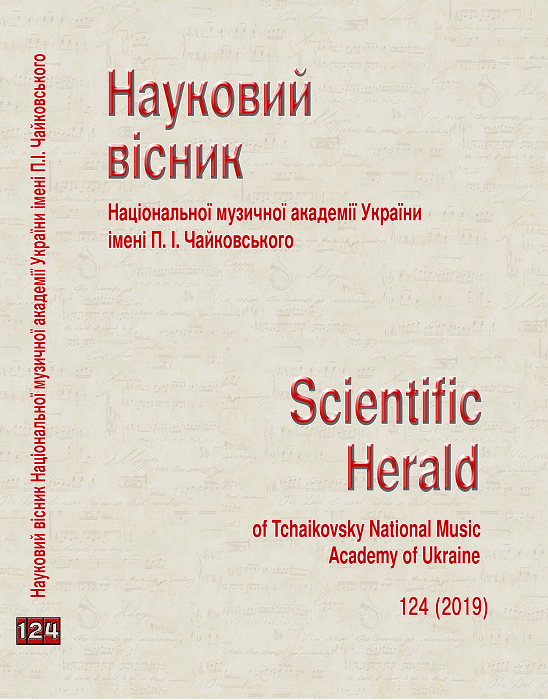Zoltan Kodály and Stanislav Lyudkevych
DOI:
https://doi.org/10.31318/2522-4190.2019.124.165421Keywords:
comparison, universal personality, Zoltan Kodály, Stanislav Lyudkevych, Hungarian and Ukrainian musical cultureAbstract
There is a fairly rich base for comparing Kodály (1882–1967) and Lyudkevych (1879–1979). Both musicians were from one generation, shared their social background and received the same education. They had the same areas of their professional implementation. Both musicians represent ancient musical cultures that were freed from imperial influence in the early 20th century. If Hungarian culture got rid of the German influence, then Ukrainian culture fell under Soviet pressure, remaining colonial. This explains mainly the difference in the methods and results of the implementation of folk, composer, pedagogical work of Kodály and Lyudkevych.
Downloads
References
Bukofzer, Manfred F. (1947). Music in the Baroque Era from Monteverdi to Bach. N.Y.: W. W. Norton&Company. Inc., 489 р. [in English].
Kyianovska, L. (2007). Galician music culture of the nineteenth and twentieth centuries. [Halytska muzychna kultura XIX–XX stolittia]. Chernivtsi: Knyhy – XXI, 424 p. [in Ukrainian].
Kodaj, Z. (1982). Featured Articles [Izbrannye stat’i]. Moscow: Sovetskij kompozitor, 288 p. [in Russian].
Liudkevych, S. (1999). Research, articles, reviews [Doslidzhennia, statti, retsenzii]. T. 1. Lviv: M. P. Kots, 495 p. [in Ukrainian].
Liudkevych, S. (2000). Research, articles, reviews, speeches [Doslidzhennia, statti, retsenzii, vystupy]. T. 2. Lviv: M. P. Kots, 815 p. [in Ukrainian].
Sabol’chi, B. (1964). History of hungarian music [Istorija vengerskoj muzyki]. Budapesht: Korvin, 246 p. [in Russian].
Snaider, T. (2012). The transformation of nations. Poland, Ukraine, Lithuania, Belarus. 1569–1999 [Peretvorennia nacii. Polshcha, Ukraina, Lytva, Bilorus. 1569–1999]. Kyiv: Dukh i Litera, 464 p. [in Ukrainian].
Chekan, Yu. (2012). Musical Comparative Literature: From Method to Science [Muzykoznavcha komparatyvistyka: vid metodu – do nauky]. Music Studies Studies at the Institute of Arts of the Volyn National University named after Lesya Ukrainka and the National Music Academy of Ukraine named after P. I. Tchaikovsky [Muzykoznavchi studii Instytutu mystetstv Volynskoho natsionalnoho universytetu imeni Lesi Ukrainky ta Natsionalnoi muzychnoi akademii Ukrainy imeni P. I. Chaikovskoho], vol. 10, pp. 6–11 [in Ukrainian].
Shtunder, Z. (2005). Stanislav Lyudkevich. Life and creativity. T. I (1879–1939) [Stanislav Liudkevych. Zhyttia i tvorchist. T. I (1879–1939)]. Lviv: PP «Binar», 635 p. [in Ukrainian].
Shtunder, Z. (2009). Stanislav Lyudkevich. Life and creativity. T. ІI (1939–1979) [Stanislav Liudkevych. Zhyttia i tvorchist. T. II (1939–1979)]. Lviv–Zhovkva: Misioner, 360 p. [in Ukrainian].
Jese, L. (1980). Zoltan Kodai. Day after day [Zoltan Kodaj: Den’ za dnem]. Moscow: Muzyka, 269 p. [in Russian].
Yakubiak, Ya. (2003). Mykola Lysenko and Stanislav Lyudkevich [Mykola Lysenko i Stanislav Liudkevych]. Lviv: DVTs NTSh, 263 p. [in Ukrainian].
Downloads
Published
How to Cite
Issue
Section
License
Our journal abides by the CREATIVE COMMONS copyright rights and permissions for open access journals.
Authors, who are published in this journal, agree to the following conditions:
The authors reserve the right to authorship of the work and pass the first publication right of this work to the journal under the terms of a Creative Commons Attribution License, which allows others to freely distribute the published research with the obligatory reference to the authors of the original work and the first publication of the work in this journal.
The authors have the right to conclude separate supplement agreements that relate to non-exclusive work distribution in the form in which it has been published by the journal (for example, to upload the work to the online storage of the journal or publish it as part of a monograph), provided that the reference to the first publication of the work in this journal is included.




